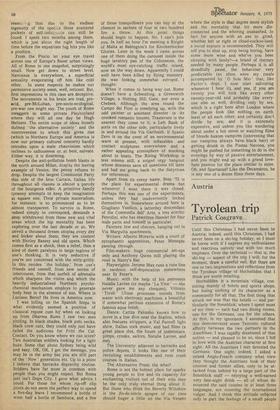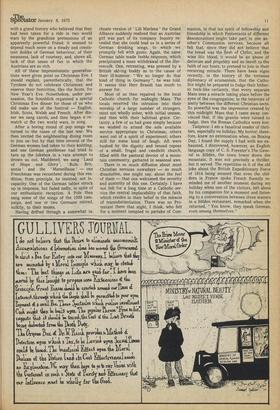Austria
Tyrolean trip
Patrick Cosgrave.
Until this Christmas I had never been to Austria; indeed, until this Christmas, I had never been on a ski-ing holiday; so I must be borne with if I express my enthusiasms and reactions naively and with too much emphasis. Over the technical — that is, the ski-ing — aspect of the trip I will, for the moment, draw a careful veil. But there are one or two impressions and reflections from the Tyrolean village of Hochsolden that I think are worth retailing.
Hochsolden is a mountain village, consisting mainly of hotels and sports shops, but losing nothing of its character as a community for all that. The first thing that struck me was that the hotels — and particularly the Sonnblick, where I spent most of my time — each had two dining rooms, one for the Germans, one for the others. At first, in my ignorance, I assumed that this demonstrated some Teutonic cultural affinity between the two partners in the Anschluss. I was rapidly disabused of that notion — and pleased to be so, since I fell in love with the Austrian character at first sight. All the Austrians I met detested the Germans. One night, indeed, I asked a mixed Anglo-French company what view they thought the Austrians took of their cousins and former allies, only to be attacked from behind by a large part of the Sonnblick staff — enjoying a well-earned very late-night drink — all of whom denounced the said cousins in at least three languages, not counting the international vulgar. And I think this attitude reflected only in part the feelings of a small people
with a grand history who believed that they had been taken for a ride in two world wars by the grandiose pretensions of an apparently powerful friend: it seemed to depend much more on a steady and consistent dislike of German behaviour, of their meanness, lack of courtesy, and, above all, lack of that sense of fun in which the Austrians are so rich.
All of these impressionistic generalisations were given point on Christmas Eve. I should explain, parenthetically, that the Tyrolese do not celebrate Christmas; and reserve their festivities, like the Scots, for New Year's Eve. Nonetheless, under persuasion, the Sonnblick organised a special Christmas Eve dinner for those of us who did make use of the festival — English, Irish, Scots, Welsh and French. After dinner we sang carols, and then began a rematch of the two world wars, in song.
After a boring round of pop songs we turned to the tunes of the last war. We then invited the neighbouring dining room to join us: but by that time several of the German women had taken to their knitting; and one German gentleman had tried to turn up the jukebox in a vain attempt to drown us out. Maddened, we sang 'Land
of Hope and Glory ', 'Rule, Britannia ' and the ' Marseillaise ' — one Frenchman was recumbent during this rendition, from principle, he insisted, not incapacity. One of the German tables struck up in response, but faded sadly, in spite of our enthusiastic reception. A Pole then sang some of the songs of the 1939 campaign, and one or two Germans retired, sulkily, to their rooms.
Having drifted through a somewhat in choate version of 'Liii Marlene' the Grand Alliance suddenly realised that an Austrian girl was part of its company. Inquiry revealed that she could lead us in a series of German drinking songs, to which we promptly fell with gusto. Again, the same German table made feeble response, which precipitated a mass withdrawal of the Herrenvolh. One, retreating, was pressed by a British ski-ing buddy as to the cause of their ill-humour. "We no longer do that kind of thing in Germany ", he was told. It seems that Herr Brandt has much to answer for.
Most of us then repaired to the local Catholic church for midnight Mass. The locals received the intrusion into their worship of a large number of strangers, most not wholly sober, with initial unease, and then with their habitual grace. Certainly, a few of us had gone simply because we wished to attend the sole available service appropriate to Christmas; others went out of a spirit of experiment; others still for some kind of laugh. All were hushed by the dignity and tensed repose of a small, frugal and candlelit church, filled with the pastoral devout of a mountain community, gathered in seasonal awe.
There is so much diffusion about most Christian services nowadays — so much
dissolution, one might say, about the feel
of them — that one welcomed the severity and austerity of this one. Certainly. I have not felt for a long time at a Catholic service the central implacability of that faith, which resides in their belief in the miracle
of transubstantiation. There was no Protestant there that night, I think, who felt for a moment tempted to partake of Com munion, in that lax spirit of fellowship and friendship in which Protestants of different denominations might take part in one another's Communion services, because all felt that, since they did not believe that the bread was the flesh of Christ, and the wine His blood, it would be an abuse of decorum and propriety and an insult to the faith of our hosts, to pretend to join in their recurring miracle. There have been signs recently, in the history of the tortuous diplomacy of ecumenism, that the Catholics might be prepared to fudge their hitherto rock-like certainty, that every separate Mass sees a miracle taking place before the eyes of the congregation, in the interests of amity between the different Christian sects. So powerful was the impression created by this midnight Mass that I came away convinced that, if the granite were turned to fudge, then the Roman Catholics were lost.
Tailpiece: I am a fanatical reader of thrillers, especially on holiday. My horror, therefore, knew no extenuation when, on Boxing Day, I found the supply I had with me exhausted. I discovered, however, an English language copy of C. S. Forester's The General in &Aden, the town lower down the mountain. It was not precisely a thriller, but it served. The repetition in it of the old joke about the British Expeditionary Force of 1914 being amazed that even the chil
dren in France spoke French fluently reminded me of another moment during my holiday when one of the visitors, left alone by his companion for a moment and listening to a conversation between three waiters in a Solden restaurant, remarked when she returned, "You know, they speak German, even among themselves."


































 Previous page
Previous page